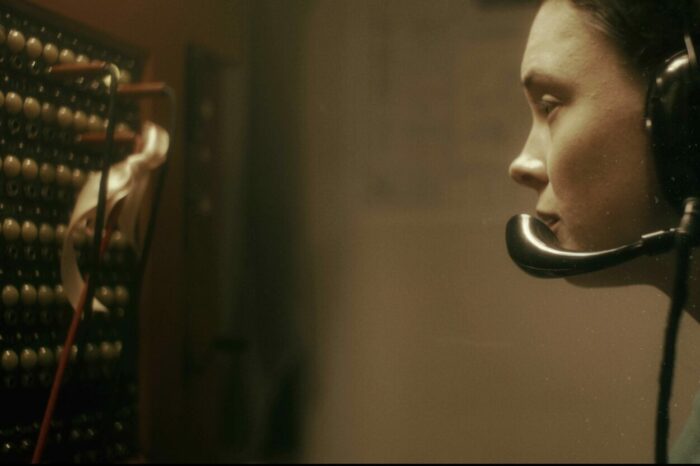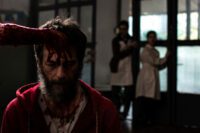The British drama thriller On the Line sets itself a challenge: all of its action is confined to a single visible character in a tiny workspace with all of her communication occurring over the mid-century landline telephone switchboard she operates. With an adroit script and careful direction by first-time feature filmmaker Oliver Pearn and a convincing performance by lead Victoria Lucie, On the Line manages both to deliver some offscreen suspense and a generous characterization of its protagonist, a young woman hoping to atone for a past mistake by solving the mystery on the other side of the line.
Lucie, who is onscreen for every minute of On the Run‘s 74 minutes, plays Agnes, a 24-year-old switchboard operator in the Channel Islands. It’s 1964: communications on the Islands are entirely dependent upon her timely connecting one telephone patron to another as she fields calls, connects plugs, and toggles switches. Hers was, as the found-footage documentary The Phantom of the Operator suggests, a decidedly gendered profession, one assigned almost always to women, subject to no small amount of casual misogyny. Between linking up one islander to the next, she smokes (she’s independent), reads (Jack London’s White Fang, a naturalist novel of survival and domestication; she’s intellectual), and pores over a precious few personal belongings, especially a pink ribbon she uses to tie her hair. She’s also more than a little competent, soldering loose connections and practicing her elocution.

A few of her interlocutors are friends and family, including her priest, Father McKenzie (sound familiar?); her fiancé, Frank; and the police receptionist, Betty, with whom Agnes seems to share a testy friendship. To pass the time, Agnes idly listens in on some of the calls: she’s in a position to hear almost anything communicated by phone on the islands. Hers is an aural panopticon of sorts, if with a single strict limitation.
When one of the calls signals distress, Agnes is convinced she’s witnessed—aurally, anyway—a kidnapping. With nothing but her intellect and conversational skill, Agnes identifies the kidnapper and victim, traces their escape, and alerts the police to their location. But the information that comes her way is always partial and mediated; not every one of Agnes’ educated guesses turns out to be correct. And so, what begins as a simple case of whodunit and where becomes more and more complex.
As Agnes, Lucie carries the film’s burden, and her performance is stellar. There’s ample opportunity for characterization, and the script provides plenty of small hints about her past, present, and future, but Lucie has to act only against her set, props, and camera. Every single one of her actions and reactions feels wholly organic and convincing.

The other characters are limited to their brief phone conversations, heard only offscreen and in small parcels. The film’s central conceit—limiting the protagonist to a single location, her communications to mediated calls, information to a minimum—is one that presents its challenges. Not only is the lead actor prohibited from engaging face to face with any of her colleagues, but the script must also parcel out information in small doses and via technologically delimited ways. That is to say, information must come only from characters on land lines, which in the ’60s were available only in private homes, businesses, and public booths—a far cry from the ubiquity of smart phones and cell coverage today.
A lot, then, in On the Line depends on the plausibility of the situation, which plays out as a tale of severe mental anguish and physical violence—a type of trauma with which Agnes can connect. She’s still grieving the loss of a good friend to a suicide she thinks she might have prevented, but now she is mature enough to channel her anguish, decode signs of distress, and employ her own calm, therapeutic discourse to solve the mystery.
On its single set and with the constraints of its central conceit, Pearn’s feature makes the most of its small budget and narrative limitations. Jonathan Nicol’s cinematography frames Lucie from several perspectives without ever seeming repetitive or gratuitous, and composer Matthew Collings subtly incorporates the sounds of a switchboard into its score. Editor Harry Baker favors the long take—On the Line’s Average Shot Length must be among the longer in recent memory—in a way that allows Lucie to portray her character’s anguish and concern convincingly.
The emergency-dispatch narrative features in similar films like The Call (2013), Operator (2015), and The Guilty (2018, remade in 2021), and the forced-but-limited perspective was made famous by Alfred Hitchcock in Rear Window. Pearn can’t call on the star power of a Halle Berry or Jake Gyllenhaal (or for that matter, a Jimmy Stewart) to carry the film, but Lucie delivers her share of pluck regardless, and the script’s attentiveness to early second-wave feminism and the lingering collective trauma of World War II give his On the Line its quiet gravitas.
On the Line is playing at the 2023 Newport Beach Film Fest and other festivals in the US and UK.




